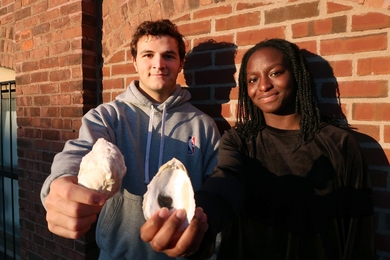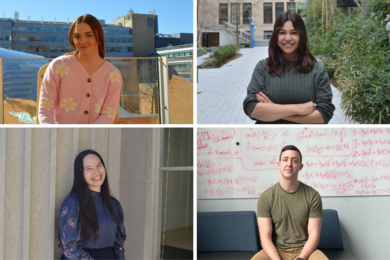CAMBRIDGE, Mass. -- MIT graduate students Myles A. Walton and Annalisa L. Weigel, husband and wife, successfully defended their Ph.D. theses in separate morning and afternoon sessions on the same day.
They will receive the degrees in a special hooding ceremony on Thursday, June 6, at 1 p.m. in the Johnson Athletic Center on the MIT campus.
Before mounting his defense of "Managing Space System Design Uncertainty Using Portfolio Theory" at 8:15 a.m. on May 6, Walton donned a dress shirt and tie. About seven hours later, Weigel toted her lucky water bottle and straw to the podium in the same room to defend "Bringing Policy Into Space Systems Conceptual Design: Qualitative and Quantitative Methods." Walton is from Marlboro, Mass.; Weigel's hometown is Avon, Conn.
By dusk, they were celebrating in a Central Square pub.
"It was tremendously supportive to go through it together," said Weigel, who received the S.B. from MIT in 1994 in aeronautics and astronautics, the S.B. in science, technology and society a year later, and the S.M. in aeronautics and astronautics in 2000. "We got a fair amount of insight and counseling from each other." Her Ph.D. from the MIT Engineering Systems Division (ESD) is in technology, management and policy.
"We'd challenge each other's assumptions," said Walton, a Worcester Polytechnic Institute graduate (B.S. in mechanical engineering, 1997) who received the S.M. in aeronautics and astronautics from MIT in 1999. His Ph.D. is in aeronautics and astronautics.
"We'd do it in a collegial way," said Weigel, who also has an M.A. in science, technology and public policy from George Washington University. "We're not confrontational people."
"Somebody said our household must have been tremendously tense," said Walton. "Actually, it wasn't tense at all. We were never home."
"And we got to go out and celebrate together," Weigel said.
After the hooding ceremony, the couple is headed for Wall Street to do equity research on space-related companies, Weigel at Lehman Brothers and Walton for Morgan Stanley.
They met while both were assigned to the same laboratory group as research assistants at the Lean Aerospace Initiative in 1998. When friends asked Walton, a drummer, to play piano at their wedding, he turned to Weigel, who is an accomplished pianist.
She loaned her keyboard and amplifier to Walton and helped him master Wagner and Mendelssohn. Normal laboratory camaraderie blossomed into a closer relationship. "He did really well," said Weigel, who did not attend the wedding. "If I were there, it probably would have made him nervous."
They got engaged in 1999 and married on Aug. 26, 2000.
"They got married when they both worked for me," said Professor Daniel Hastings of aeronautics and astronautics and engineering systems, who was advisor to both. "When they started working for me, they were engaged. It did not make any difference to me since I treated and saw them individually."
Hastings joked that MIT saved the cost of one hotel room when Walton and Weigel attended conferences or met with sponsors. "I also found that I could pass things on to one of them and the other would get it," he said.
Their peers in the Department of Aeronautics and Astronautics and the Engineering Systems Division program packed the room for their presentations, joined by faculty and students from allied disciplines. Despite lack of sleep, each handled pointed questions with poise.
"It was a pleasure working with both of them because they are first-rate students, which is the best reason to be at MIT," said Hastings, who also is associate director of the Engineering Systems Division. "In both cases, their work has really impressed the sponsors."
The admiration was mutual.
"We were lucky to have advisors and research groups who didn't see the fact that we are married as a distraction," said Walton.






